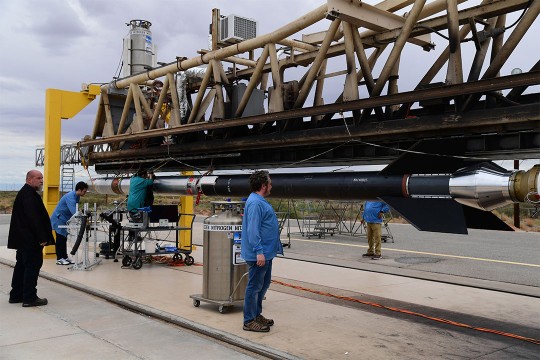News
Astrophysical Sciences and Technology MS
-
January 14, 2025
![The Ring Nebula as captured in visible light by Hubble Space Telescope]()
RIT professor leads research showing true structure of the iconic Ring Nebula
Scientists now have obtained the clearest three-dimensional view of the nebula, thanks to a research team led by Carlson Center for Imaging Science and School of Physics and Astronomy Professor Joel Kastner.
-
August 28, 2024
![RIT professor Manuela Campanelli introduces the rest of the team from RIT that worked on simulations and methods to detect gravitational waves.]()
RIT astrophysicist named one of world's most influential female scientists
Democrat and Chronicle highlights the accomplishments of Manuela Campanelli, Distinguished Professor of Astrophysics in the School of Mathematics and Statistics. (This content will require a subscription to view.)
-
February 7, 2024
![CMOS detector]()
NASA, RIT Center for Detectors partner to help future spacecraft survive longer, harsher missions
RIT's Center for Detectors has been chosen by NASA for two research programs: Early Stage Innovations (ESI) and Strategic Astrophysics Technology (SAT), with the hope of helping future spacecraft find new discoveries in the vast universe.
-
July 12, 2023
![five galaxies surrounded by stars in space.]()
NASA releases spectacular image to celebrate James Webb Space Telescope
The Washington Post talks to Jeyhan Kartaltepe, associate professor in RIT's School of Physics and Astronomy, and Rebecca Larson, postdoctoral research associate in RIT’s School of Physics and Astronomy, about images from the James Webb Space Telescope.
-
June 29, 2023
![simulation of two supermassive black holes with yellow, orange, and purple swirls.]()
RIT astrophysicist comments on supermassive binary black hole discovery
Astrophysicists using large radio telescopes to observe a collection of cosmic clocks in our galaxy have found evidence for gravitational waves that oscillate with periods of years to decades, according to a set of papers published Thursday in The Astrophysical Journal Letters.
-
June 12, 2023
![aerial view of a facility in the middle of nowhere.]()
Gravitational-wave detectors start next observing run to explore the secrets of the universe
According to scientists from across the globe—including those working on the project from RIT—this observing run by the LIGO-Virgo-KAGRA (LVK) collaboration features upgraded instruments, new and even more accurate signal models, and more advanced data analysis methods.
-
May 31, 2023
![person pointing to stars in space on a laptop screen.]()
RIT scientists unveil Citizen Science Project to search for distant galaxies
In collaboration with NASA, RIT unveiled a website asking for volunteers to join an effort to take critical measurements that will aid astronomers in identifying the “fingerprints” of different chemical elements present in galaxies and measuring their distances.
-
May 8, 2023
![researcher touching a glowing star in space.]()
Unfolding the universe
Associate Professor Jeyhan Kartaltepe has her hands full studying data from the most powerful observational instrument ever made, while continuing to bolster her reputation as a teacher and mentor. Her work has gotten the attention of the astronomy community worldwide.
-
April 14, 2023
![scientists checking on a rocket at a missile range.]()
RIT scientists aim to understand the history of light production in the universe through the CIBER-2 experiment
Scientists from RIT, Caltech, Kwansei Gakuin University in Japan, and the Korea Astronomy and Space Science Institute will launch a rocket on Sunday for a short flight into space with the goal of resolving discrepancies about the sources of near-infrared light in the universe.
-
March 10, 2023
![four images of galaxies that show swirls and clumps of stars.]()
First images released from JWST’s largest general observer program
Tech Explorist features the first images from the largest program in the James Webb Space Telescope, COSMOS-Web, co-led by principal investigator Jeyhan Kartaltepe, associate professor in the School of Physics and Astronomy.
-
March 9, 2023
![four images of galaxies that show swirls and clumps of stars.]()
New images from James Webb telescope released, part of RIT co-led research project
WROC-TV features the first images from the largest program in the James Webb Space Telescope, COSMOS-Web, co-led by principal investigator Jeyhan Kartaltepe, associate professor in the School of Physics and Astronomy.
-
March 9, 2023
![four images of galaxies that show swirls and clumps of stars.]()
First images released from James Webb Space Telescope’s largest general observer program
The first images from the largest program in the James Webb Space Telescope’s first year show many types of galaxies. Scientists from the COSMOS-Web program released mosaic images taken in early January by the telescope. COSMOS-Web, co-led by principal investigator Jeyhan Kartaltepe, aims to map the earliest structures of the universe.
















